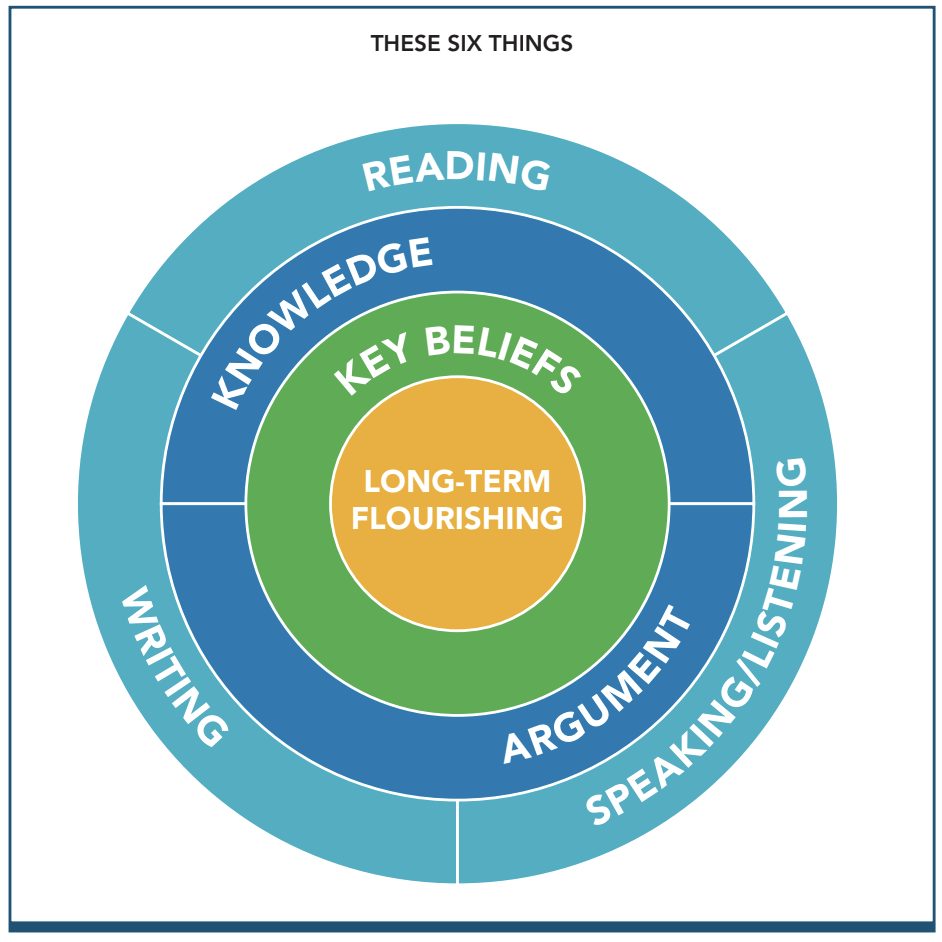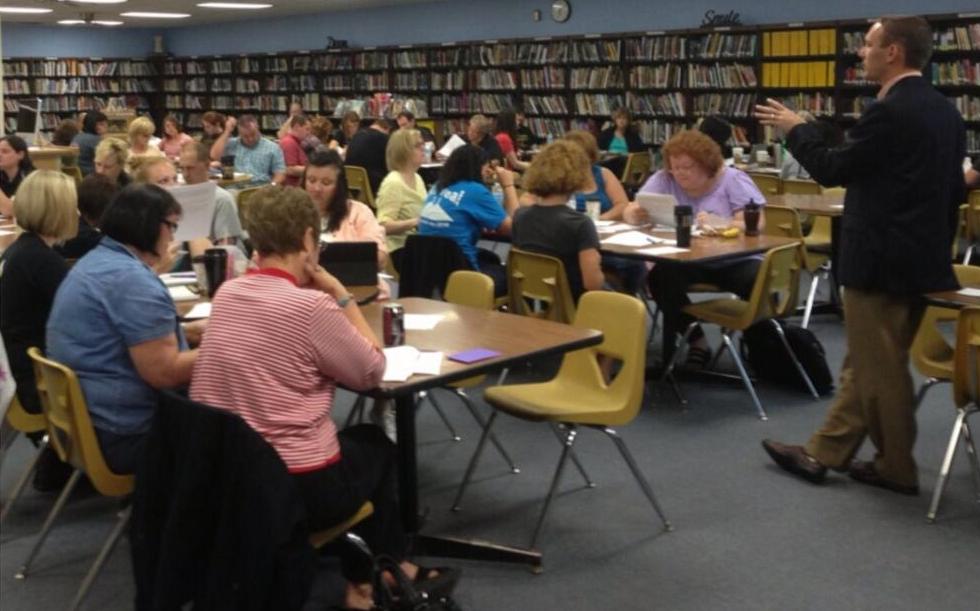There is a lot of clutter in the PD market when it comes to literacy instruction, and this workshop stands out in several ways:
- Many workshops emphasize one aspect of literacy (e.g., reading or writing), but mine is rooted in a holistic framework that encompasses oft-neglected topics like the beliefs underlying student motivation and the critical role of knowledge-building across the school day. While I can craft my workshops to emphasize the aspect of literacy your group is focusing on (e.g., argumentative writing), I always root my trainings in the Framework so that participants don't lose a sense of the whole picture.
- I'm a practicing high school teacher, and so my trainings are rooted in current classroom realities. I incorporate stories from some of my most recent lessons, and participants learn just as much from my analysis of my moments of failure in the classroom as they do from my moments of success.
- I believe in the power of both theory and practice, and so my workshop provides ample citations from the literature and stories from my own classroom. Teachers will recognize some of the voices and reports I bring into the segments of the workshop, and they will also walk away with some new directions for their professional reading.
- I'm strongly of the opinion that teachers in the United States are not given permission to focus, and, therefore, they tend to operate in a performance-inhibiting, high-stress survival mode. This is why my entire workshop is built around a “More Learning, Less Stress” ethos. Because of this, my workshop gives teachers across the content areas a rare, liberating, empowering permission: to build expertise with six high-impact, big-bang-for-your-buck instructional habits.
- I'm accessible. Because I take on a limited number of speaking engagements per year, I freely give my personal email to participants, and I've been fortunate to enjoy lasting relationships with workshop participants from around the country.

Up to six hours, six topics, and lots of hands on
More is not always better, and that's why Dave's workshop intentionally aims at manageability and practicality.
Two examples:
- There are 100 mental models for thinking about reading instruction — Dave teaches, models, and has workshop attendees engaging with one.
- There are hundreds of ways to get students talking — this workshop uses only three — one for pairs, one for small groups, and one for whole class — and shows participants how to master and tweak the three structures for maximum effect.
The result is the opposite of overwhelming; teachers leave Dave's workshop empowered and ready to modify their instructional approaches for Monday.
Here's what folks are saying
What a great day with @davestuartjr leading our PD today. #d211 pic.twitter.com/ibODQ7XNOq
— Susan Hess (@Shess2112) October 10, 2017
Dave is one of the best speakers I've ever booked… in fact, I've used him several times, and will continue to do so. He is passionate and engaging. He speaks directly to teachers about their work, backed by not only his classroom experiences, but skillfully integrating in research, as well. He holds a high bar for the work of creating students who think.— Lisa Vahey, March 6, 2017
@davestuartjr the “Non-Freaked Out Approach to Literacy Instruction” we love your approach! #education pic.twitter.com/8CHMn1UhB3
— Lindie Schweitzer (@lindieswcs) June 8, 2016
His workshop was amazing for me. I walked away with some great ideas to incorporate into my math and science class that will support the literacy standards. I really liked his pop up idea.
I really valued that he is also a teacher and completely understands what we are all going through. He knows that we are moving slow and trying to focus on at least one subject or certain standards to get really good at and then move on to others. I also valued that he mentioned he knows this process will take years. I really enjoyed the writing components and how he used pop up debates for argument writing. This also brought up the use of PVLEGS which is a great way to get students ready to not front of the whole class.
To the point, clear and organized. Thank you for valuing our time.
@davestuartjr Great presentation today at MGM. Thanks for coming and sharing your knowledge with us.
— Joe Bruister, Jr. (@joebruister1) August 6, 2015
Why the Non-Freaked Out Approach competes with the best PD on the market
I've sat in on numerous literacy trainings (Common Core and otherwise) and viewed many more online. Here's why the NFO Approach to literacy instruction rocks:
- It emphasizes the most important elements of the reading, writing, and speaking/listening standards — allowing your teachers to become great at the biggies and not stress on the smallies.
- It leverages the solid (but widely un-implemented) research around noncognitive factors, those conditions that make or break a classroom. Every teacher is familiar with these, but few have been given PD experiences that clarify and simplify them.
- It destresses the far-too-stressful job of teaching, allowing your staff to focus on honing their craft in several key areas and, at the end of the day, remembering why it is that they answered the call to teach.
[button link=”#_contact” color=”silver” bg_color=”#1f1c1f” window=”yes”]Dave, I'd like to figure out how to bring you to my school.[/button]
Here's how Dave works with your school to make your workshop a success
Dave is a high school history and English teacher, but that doesn't keep him from ensuring that your workshop is fine-tuned to your group of teachers.
When you contact Dave, he begins the email correspondence with a discussion of dates, rates, and a response to any of your other initial questions.
When a date is confirmed, Dave likes to set up a phone meeting to discuss how his workshops generally flow and what tweaks your group might appreciate.
Leading up to the event, Dave is available to you through phone and email. After the event, Dave is available to meet with district leaders to discuss next steps, ensuring that the workshop's momentum carries forward.
Not your typical workshop facilitator

Unlike many PD providers, Dave is actually in the classroom every day, teaching a full load of students in a mixture of English and history courses.
So while most PD facilitators will say, “Yes, I'm a teacher. I mean, we're all teachers, right?” Dave means it literally and in the present tense.
As a result of this, it is virtually impossible for Dave to lose touch with the realities of teaching, and audiences immediately sense that. Just when he starts to think he's discovered some new, silver bullet strategy, his students will stare at him with glazed eyes and he'll know it's time for reteaching.
Nothing Dave will speak about with your staff is merely theory and research — it's theory and research applied and worked out and perfected in the crucible of a secondary English and social studies classroom.
So if your teachers are tired of having people tell them the laundry list of things they should be doing, and if you're ready instead to let them focus and become excellent at the key, high-bang-for-your-buck literacy strategies outlined in the modules described above… well, then we should get in touch.
[button link=”#_contact” color=”silver” bg_color=”#1f1c1f” window=”yes”]Dave, let's talk details, brother.[/button]
Shall we dance? Or at least learn together?
Because Dave's a teacher and because he wants to provide high-quality PD, he only works with a limited number of schools per year.
If you'd like to be one of them, let's talk using the contact form below.